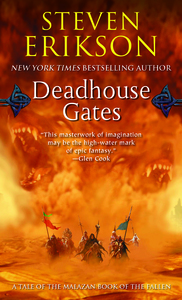Take a photo of a barcode or cover
The tone of Deadhouse Gates could best be described as an overwhelming sense of morbid futility in a world where all that is known is death and injustice. I am a major fan of the Grim Dark fantasy genre, but this story was almost too much for me to handle. I almost had to put the book down because of Felisen’s character ark. However, though this book may be one of the saddest stories I’ve read, what separates Deadhouse Gates from the Grim Dark subgenre is this life-giving sense of empathy spaced out throughout the story. This empathy manages to add in my opinion desperately needed color to an otherwise very dark and death blessed world. Tones of empathy, comradery, and courage are spread out through this book like water pools in a desert.
This quote is one of my favorite examples of the contrasting tones of futility and empathy.
“The unnamed soldier is a gift. The named soldier--dead, melted wax--demands a response among the living...a response no-one can make. Names are no comfort, they're a call to answer the unanswerable. Why did she die, not him? Why do the survivors remain anonymous--as if cursed--while the dead are revered? Why do we cling to what we lose while we ignore what we still hold?
Name none of the fallen, for they stood in our place, and stand there still in each moment of our lives. Let my death hold no glory, and let me die forgotten and unknown. Let it not be said that I was one among the dead to accuse the living.”
― Steven Erikson, Deadhouse Gates
What makes Deadhouse Gates a masterpiece of modern literature in my humble opinion, is the philosophical undertones about life in a fantasy setting that is so beautifully written it makes you question reality. With a myriad of dichotomous tones like duty and friendship, empathy and hate, or futility and courage, Steven Erickson can orchestrate events within this epic among epic fantasies that will leave you breathless with memories that will stick with you like no other work can manage.
What I love about Steven Erickson so far is how he writes in a way where no word is without purpose. I am constantly rereading pages again and again because there is so much written with so minimal words that I am sure everyone takes something completely different from the story.
I have read nearly every work by both Robert Jordan and Brandon Sanderson and though they may be my favorite authors, neither of them can master such depth of character as this story manages with certain characters. It just absolutely astounds me that what Steven Erickson is able to do with one book is more than some authors can manage in fourteen.
So to conclude, although this may be the best book I have ever read I most likely will not be recommending this to anyone anytime soon because of the sheer difficulty required to read these books and because of some of the vivid evil acts that happen in this story that I almost couldn’t handle.
If it wasn’t for the bad beginning I‘d have given it 4 stars.
I struggled with the first 20%, there were so many characters all over this continent going somewhere and being on a quest. Then someone leaving there and joing here and disappearing there and appearing here ...
It was hard to keep track and confusing.
After I pushed through to 23% it got way better and I enjoyed it.
I love the little philosophical and prose-like bits and the fantasy is epic in this series. I can’t imagine where all of this is going.
That ending was amazingly written.
Again, one can see that it has huge potential and now I can say that I‘m definitely in for the rest of the series, because I want to find out!
Het lezen, bedoel ik dan, niet het verhaal: dit is een soort zijstap voor een paar personages van het vorige boek; voor zover ik me herinner, worden de verhalen van boek 1 en 2 weer opgepakt in boek 3.
In de Zeven Steden is een revolutie op til (met een soort profetes en woestijnstammen, shades of Fremen en Muad-Dib), de meest populaire generaal van het keizerrijk is buiten de wet gesteld, adel wordt massaal verscheept naar dwangarbeid in de mijnen.
De verschillende plotlijnen overlappen nauwelijks, en alles vindt door elkaar plaats:
Icarium, een onsterfelijke uitvinder die regelmatig stukken tijd verliest, is op zoek naar iets, maar hij weet niet naar wat. Zijn compagnon en vriend Mappo, ook onsterfelijk, moet er eigenlijk voor zorgen dat Icarium zijn geheugen niet terugvindt. Ze geraken terecht in een oorlog tussen D’Ivers en Soletaken, twee soorten shapeshifters (de eerste kunnen de vorm van veel beesten tegelijk aannemen, zoals een zwerm vliegen of een roedel honden, de tweede kunnen in één ding veranderen, zoals pakweg een draak), en ze komen daarbij in de buurt van Iskaral Pust, een krankzinnige (enfin vermoeden we toch, wie weet) priester.
Coltaine is de leider van het 7de Leger van het Malazanrijk. Hij probeert zijn leger, en duizenden vluchtelingen erbij, te voet naar de andere kant van het continent in veiligheid te brengen. Daarbij wordt hij voortdurend achtervolgd door een numerische overmacht, tegengewerkt door de adel die ook bij die vluchtelingen zit, en verliest hij stapels volk aan de woestijn. Duiker, ex-soldaat en tegenwoordig keizerlijk historicus, vergezelt het 7de na een tijd.
Felisin Paran, jongste zus van de Paran in het vorige boek, geraakt in de mijnen terecht. Cue schrikkelijke scènes van verkrachting en verslaving en verminking en alles. Zij wordt vergezeld van Heboric, een ex-hogepriester (zonder handen) van de oorlogsgod Fener en Baudin, een soort straatvechter die Felisin in bescherming lijkt te nemen, tegen haar goesting. Alles is tegen haar goesting, trouwens, na voormelde verkrachtingen en verslavingen en verminkingen: bepaald ambetante madam, die Felisin.
En dan zijn er nog een paar personages van het vorige boek: Apsalar, die terug wou gaan naar haar geboortedorp en geëscorteerd wordt door veteranen Kalam en Fiddler, en door loverboy-slash-dief Crokus.
Begint het al wat te duizelen? Tja. Dat is denk ik de situatie na een bladzijde of honderd, en dan gaat het nog wat meer loos, met personages en situaties en achtergronden en alles.
Het wordt er allemaal niet beter op, vrees ik, naarmate de reeks verder gaat. Erikson slaagt er hier meer in om zijn personages leven te geven — met Felisin, Kalam en Duiker als uitschieters — en zijn wereld voelt nog altijd even enorm goot en enorm gedetailleerd en enorm geschiedenisvol aan als in het vorige boek. Wat minder geforceerde expositie misschien zelfs, en dat komt dan weer de personages ten goede.
Ontroerend, ook, vaak. In de kleine dingen: een compagnie soldaten in het 7de, nauwelijks omschreven, maar die in een paar scenes helemaal levend wordt; flitsen achtergrond die heelder personages plot in perspectief brengen; de manier waarop een schoothond omschreven wordt.
Ja, aangeraden natuurlijk. Maar niet voor mensen die niet graag puzzelen, en ook niet voor mensen met een slecht geheugen en/of weinig verbeelding.




